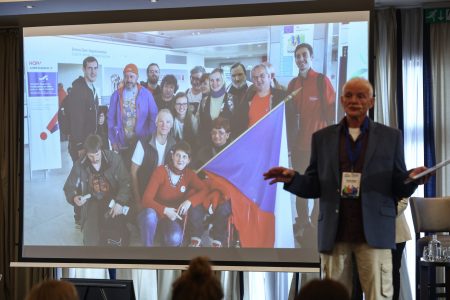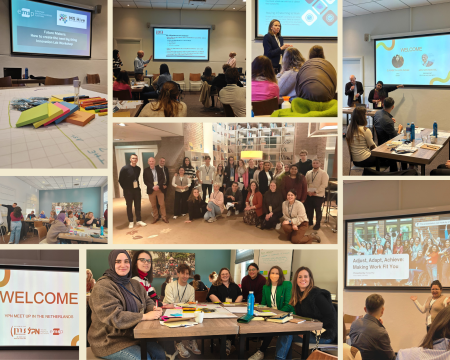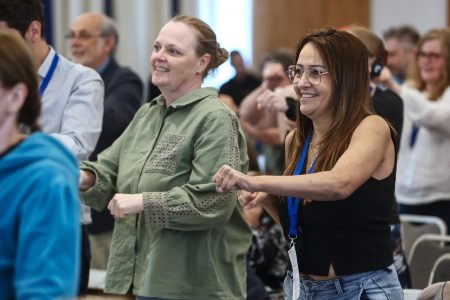
EMSP Annual Conference Day 1: Breakthrough Research and Personal Triumphs Take Center Stage
22.05.2025by Kanika Kohli
The packed conference hall buzzed with anticipation as Multiple Sclerosis (MS) advocates, researchers, and patients from around the world gathered for what would prove to be a groundbreaking event in the fight against multiple sclerosis. What unfolded over the course of this year’s conference was nothing short of remarkable—a perfect blend of cutting-edge science, deeply personal stories, and innovative approaches that are reshaping how we think about MS prevention and treatment.
Prevention: The New Frontier
Professor Eva Havrdova took the stage with a message that could change how we approach MS entirely. Her comprehensive presentation spanned decades of research, but her focus was firmly on the future: preventing MS progression before symptoms even appear.
“Early intervention is critical,” Professor Havrdova emphasised, outlining practical strategies that anyone can implement. Smoking cessation, vitamin D supplementation, and regular exercise aren’t just good health practices, they’re powerful tools in the fight against MS progression. Her research demonstrates that when we act early, we can significantly delay the disease’s advance.
A Stark Reality: The Hidden Symptoms of MS
Perhaps the most eye-opening moment came when Tommaso Manacorda from the Italian MS Society, AISM, presented findings from the largest symptom study in MS research history. The Impact of Multiple Sclerosis Symptoms Survey reached over 17,000 people with MS across 22 countries, and the results were both illuminating and concerning.
“People with MS experience an average of 13.7 symptoms,” Manacorda revealed to the attentive audience. But majority of these symptoms are inadequately managed by current healthcare systems. The study identified a troubling pattern: non-visible symptoms like fatigue, cognitive dysfunction, and bladder issues significantly impact patients’ daily lives yet often remain invisible to healthcare providers.
Stories That Inspire Action
While research findings provided the conference’s scientific backbone, it was the personal stories that truly moved the audience. Three individuals stepped forward to share their journeys, each highlighting different aspects of the MS experience.
Jaroslav Wiener’s story was particularly powerful. Having faced paralysis, he shared his remarkable recovery journey that showcased the transformative power of sports and exercise. His testimony wasn’t just inspiring—it provided concrete evidence that physical activity can be life-changing for people with MS.
Luigi Azzarone brought urgency to the discussion, advocating passionately for rapid diagnosis and treatment protocols. His message was clear: when it comes to MS, time matters, and swift medical intervention can make all the difference.
Perhaps most importantly, Natalie Bursari, Founder- the Nerve of MS, shed light on a critical gap in MS research. She called attention to how research has historically underserved Black communities with MS, emphasising the urgent need for more inclusive approaches that ensure all populations benefit from advances in treatment and care.
Stephanie Woschek’s session on understanding comorbidities in MS drove home a crucial point: MS doesn’t exist in isolation. Heart disease, diabetes, and other conditions significantly affect how MS progresses and how treatments work. The future of MS care lies in taking a holistic approach that considers the whole person, not just the disease.
This year’s conference proved that innovation in MS care comes from unexpected directions. Antonia Kaltsatou presented fascinating research on how Greek traditional dance helps people with MS improve both movement and emotional wellbeing. By incorporating culturally meaningful physical activity, her work demonstrates that effective treatment doesn’t always come from a pharmacy—sometimes it comes from embracing our heritage. Meanwhile, the German MS Registry’s David Ellenberger revealed important gender-specific findings about sleep problems in MS, showing that men and women with the condition experience sleep issues differently. These discoveries are paving the way for more personalised treatment approaches.
Stephanie Woschek introduced MS-PAT, a groundbreaking digital platform designed specifically to help patients better understand and manage their condition. At the same time, traditional care approaches were being reimagined, as demonstrated by Jan Stanek’s inspiring work at St. Joseph’s Home in the Czech Republic, showing innovative ways to support individuals with advanced MS.
Beatriz Martínez from Esclerosis Múltiple España brought attention to an often-overlooked aspect of the MS experience: the hidden economic costs. Her research revealed financial burdens that traditional healthcare planning frequently misses, highlighting the need for more comprehensive support systems. Nele von Horstem, who lives with MS herself, emphasised the crucial importance of making complex medical information accessible and understandable for patients and their families. Her perspective reminded everyone that no matter how sophisticated our research becomes, it only matters if it translates into better lives for people with MS.
What made this conference truly special wasn’t just what happened in the presentation rooms—it was the creative ways the community was brought together. The “Neuron Hunt Challenge” turned the entire venue into an interactive learning experience, encouraging participants to explore while searching for hidden neurons. This gamification element didn’t just make learning fun; it created natural networking opportunities and built genuine community spirit. The combination of rigorous science, personal stories, and creative innovation showcased at the first day of the conference provides a roadmap for the future—one where MS is not just managed, but prevented, and where every person affected by the condition has access to the care, support, and hope they deserve.
 Your Account
Your Account


